- Home
- C. L. Moore
Shambleau and Others M Page 16
Shambleau and Others M Read online
Page 16
She was clearly visible now, in this thickened dimness – visible, and very lovely, and a little unreal. She shone with a burning clarity, the only vivid thing in the whole twilit world. Eyes upon that blazing whiteness, Smith stepped forward, scarcely realizing that he had moved.
Slowly he crossed the dark grass toward her. That grass was soft underfoot, and thick with small, low-blooming flowers of a shining pallor. Botticelli painted such spangled swards for the feet of his angels. Upon it the girl’s bare feet gleamed whiter than the blossoms. She wore no garment but the royal mantle of her hair, sweeping about her in a cloak of shining darkness that had a queer, unreal tinge of purple in that low light. It brushed her ankles in its fabulous length. From the hood of it she watched Smith coming towards her, a smile on her pale mouth and a light blazing in the deeps of her moonstone eyes. She was not blind now, nor frightened. She stretched her hand to him confidently.
‘It is my turn now to lead you,’ she smiled. As before, the words were gibberish, but the penetrating stare of those strange white eyes gave them a meaning in the depths of his brain.
Automatically his hand went out to hers. He was a little dazed, and her eyes were very compelling. Her fingers twined in his and she set off over the flowery grass, pulling him beside her. He did not ask where they were going. Lost in the dreamy spell of the still, grey, enchanted place, he felt no need for words. He was beginning to see more clearly in the odd, blurring twilight that ran the outlines of things together in that queer, tapestried manner. And he puzzled in a futile, muddled way as he went on over what sort of land he had come into. Overhead the darkness, paling into twilight near the ground, so that when he looked up he was staring into bottomless deeps of starless night.
Trees and flowering shrubs and the flower-starred grass stretched emptily about them in the thick, confusing gloom of the place. He could see only only a little distance through that dim air. It was as if they walked a strip of tapestried twilight in some unlighted dream. And the girl, with her lovely, luminous body and richly coloured robe of hair was like a woman in a tapestry too, unreal and magical.
After a while, when he had become a little adjusted to the queerness of the whole scene, he began to notice furtive movements in the shrubs and trees they passed. Things flickered too swiftly for him to catch their outlines, but from the tail of his eye he was aware of motion, and somehow of eyes that watched. That sensation was a familiar one to him, and he kept an uneasy gaze on those shiftings in the shrubbery as they went on. Presently he caught a watcher in full view between bush and tree, and saw that it was a man, a little, furtive, dark-skinned man who dodged hastily back into cover again before Smith’s eyes could do more than take in the fact of his existence.
After that he knew what to expect and could make them out more easily: little, darting people with big eyes that shone with a queer, sorrowful darkness from their small, frightened faces as they scuttled through the bushes, dodging always just out of plain sight among the leaves. He could hear the soft rustle of their passage, and once or twice when they passed near a clump of shrubbery he thought he caught the echo of little whispering calls, gentle as the rustle of leaves and somehow full of a strange warning note so clear that he caught it even amid the murmur of their speech. Warning calls, and little furtive hiders in the leaves, and a landscape of tapestried blurring carpeted with Botticelli flower-strewn sward It was all a dream. He felt quite sure of that.
It was a long while before curiosity awakened in him sufficiency to make him break the stillness. But at last he asked dreamily.
‘Where are we going?’
The girl seemed to understand that without the necessity of the bond her hypnotic eyes made, for she turned and caught his eyes in a white stare and answered:
‘To Thag. Thag desires you.’
‘What is Thag?’
In answer to that she launched without preliminary upon a little singsong monologue of explanation whose stereotyped formula made him faintly uneasy with the thought that it must have been made very often to attain the status of a set speech; made to many men, perhaps, whom Thag had desired. And what became of them afterward? he wondered. But the girl was speaking.
‘Many ages ago there dwelt in Illar the great King Illar for whom the city was named. He was a magician of mighty power, but not mighty enough to fulfil all his ambitions. So by the arts he called up out of darkness the being known as Thag, and with him struck a bargain. By that bargain Thag was to give of his limitless power, serving Illar all the days of Illar’s life, and in return the king was to create a land for Thag’s dwelling-place and people it with slaves and furnish a priestess to tend Tha’s needs. This is that land. I am the priestess, the latest of a long line of women born to serve Thag. The tree-people are his – his lesser servants.
‘I have spoken softly so that the tree people do not hear, for to them Thag is the centre and focus of creation, the end and beginning of all life. But to you I have told the truth.’
‘But what does Thag want of me?’
‘It is not for Thag’s servants to question Thag.’
‘Then what becomes, afterward, of the men Thag desires?’ he pursued.
‘You must ask Thag that.’
She turned her eyes away as she spoke, snapping the mental bond that had flowed between them with a suddenness that left Smith dizzy. He went on at her side more slowly, pulling back a little on the tug of her fingers. By degrees the sense of dreaminess was fading, and alarm began to stir in the deeps of his mind. After all, there was no reason why he need let this blank-eyed priestess lead him up to the very maw of her god. She had lured him into this land by what he knew now to have been a trick; might she not have worse tricks than that in store for him?
She held him, after all, by nothing stronger than the clasp of her fingers, if he could keep his eyes turned from hers. Therein lay her real power, but he could fight it if he chose. And he began to hear more clearly than ever the queer note of warning in the rustling whispers of the tree-folk who still fluttered in and out of sight among the leaves. The twilight place had taken on menace and evil.
Suddenly he made up his mind. He stopped, breaking the clasp of the girl’s hand.
‘I’m not going,’ he said.
She swung round in a sweep of richly tinted hair, words jetting from her in a gush of incoherence. But he dared not meet her eyes, and they conveyed no meaning to him. Resolutely he turned away, ignoring her voice, and set out to retrace the way they had come. She called after him once, in a high, clear voice that somehow held a note as warning as that in the rustling voices of the tree-people, but he kept on doggedly, not looking back. She laughed then, sweetly and scornfully, a laugh that echoed uneasily in his mind long after the sound of it had died upon the twilit air.
After a while he glanced back over one shoulder, half expecting to see the luminous dazzle of her body still glowing in the dim glade where he had left her; but the blurred tapestry-landscape was quite empty.
He went on in the midst of a silence so deep it hurt his ears, and in a solitude unhaunted even by the shy presences of the tree-folk. They had vanished with the fire-bright girl, and the whole twilight land was empty save for himself. He plodded on across the dark grass, crushing the upturned flower-faces under his boots and asking himself wearily if he could be mad. There seemed little other explanation for this hushed and tapestried solitude that had swallowed him up. In that thunderous quietn that deathly solitude, he went on.
When he had walked for what seemed to him much longer than it should have taken to reach his starting point, and still no sign of an exit appeared, he began to wonder if there were any way out of the grey land of Thag. For the first time he realized that he had come through no tangible gateway. He had only stepped out of a shadow, and – now that he thought of it – there were no shadows here. The greyness swallowed everything up, leaving the landscape oddly flat, like a badly drawn picture. He looked about helplessly, quite lost now and not sure in wha
t direction he should be facing, for there was nothing here by which to know directions. The trees and shrubs and the starry grass still stretched about him, uncertainly outlined in that changeless dusk. They seemed to go on for ever.
But he plodded ahead, unwilling to stop because of a queer tension in the air, somehow as if all the blurred trees and shrubs were waiting in breathless anticipation centring upon his stumbling figure. But all trace of animate life had vanished with the disappearance of the priestess’s white-glowing figure. Head down, paying little heed to where he was going, he went on over the flowery sward.
An odd sense of voids about him startled Smith at last out of his lethargic plodding. He lifted his head. He stood just at the edge of a line of trees, dim and indistinct in the unchanging twilight. Beyond them – he came to himself with a jerk and stared incredulously. Beyond them the grass ran down to nothingness, merging by imperceptible degrees into a streaked and arching void – not the sort of emptiness into which a material body could fall, but a solid nothing, curving up towards the dark zenith as the inside of a sphere curves. No physical thing could have entered there. It was too utterly void, an inviolable emptiness which no force could invade.
He stared up along the inward arch of that curving impassable wall. Here, then, was the edge of the queer land Illar had wrested out of space itself. This arch must be the curving of solid space which had been bent awry to enclose the magical land. There was no escape this way. He could not even bring himself to approach any nearer to that streaked and arching blank. He could not have said why, but it woke in him an inner disquiet so strong that after a moment’s staring he turned his eyes away.
Presently he shrugged and set off along the inside of the line of trees which parted him from the space-wall. Perhaps there might be a break somewhere. It was a forlorn hope, but the best that offered. Wearily he stumbled on over the flowery grass.
How long he had gone along that almost imperceptible curving line of border he could not have said, but after a timeless interval of grey solitude he gradually became aware that a tiny rustling and whispering among the leaves had been growing louder by degrees for some time. He looked up. In and out among the trees which bordered that solid wall of nothingness little, indistinguishable figures were flitting. The tree-men had returned. Queerly grateful for their presence, he went on a bit more cheerfully, paying no heed to their timid dartings to and fro, for Smith was wise in the ways of wild life.
Presently, when they saw how little heed he paid them, they began to grow bolder, their whispers louder. And among those rustling voices he thought he wasginning to catch threads of familiarity. Now and again a word reached his ears that he seemed to recognize, lost amidst the gibberish of their speech. He kept his head down and his hands quiet, plodding along with a cunning stillness that began to bear results.
From the corner of his eye he could see that a little dark tree-man had darted out from cover and paused midway between bush and tree to inspect the queer, tall stranger. Nothing happened to this daring venturer, and soon another risked a pause in the open to stare at the quiet walker among the trees. In a little while a small crowd of the tree-people was moving slowly parallel with his course, staring with all the avid curiosity of wild things at Smith’s plodding figure. And among them the rustling whispers grew louder.
Presently the ground dipped down into a little hollow ringed with trees. It was a bit darker here than it had been on the higher level, and as he went down the slope of its side he saw that among the underbush which filled it were cunningly hidden huts twined together out of the living bushes. Obviously the hollow was a tiny village where the tree-folk dwelt.
He was surer of this when they began to grow bolder as he went down into the dimness of the place. The whispers ran almost at his elbow, twittering their queer, broken speech in hushed syllables whose familiarity still bothered him with its haunting echo of words he knew. When he had reached the centre of the hollow he became aware that the little folk had spread out in a ring to surround him. Wherever he looked their small, anxious faces and staring eyes confronted him. He grinned to himself and came to a halt, waiting gravely.
None of them seemed quite brave enough to constitute himself spokesman, but among several a hurried whispering broke out in which he caught the words ‘Thag’ and ‘danger’ and ‘beware’. He recognized the meaning of these words with-out placing in his mind the origins in some tongue he knew. He knit his sun-bleached brows and concentrated harder, striving to wrest from that curious murmuring whisper some hint of its original root. He had a smattering of more tongues than he could have counted offhand, and it was hard to place these scattered words among any one speech.
But the word Thag’ had a sound like that of the very ancient dryland tongue, which upon Mars is considered at once the oldest and most uncouth of all the planet’s languages. And with that clue to guide him he presently began to catch other syllables which were remotely like syllables from the dryland speech. They were almost unrecognizable, far, far more ancient than the very oldest versions of the tongue he had ever heard repeated, almost primitive in their crudity and simplicity. And for a moment the sheerest awe came over him, as he realized the significance of what he listened to.
The dryland race today is a handful of semi-brutes, degenerate from the ages of past time when they were a mighty people at the apex of an almost forgotten glory. That day is millions of years gone now, too far in the past to have record in the vaguest folklore. Yet here was a people who spoke the rudiments of that race’s tongue as it must have been spoken in the race’s dim beginnings, perhaps a million years earlier even than that immemorial time of their triumph. The reeling of millenniums set Smith’s mind awhirl with the effort at compassing their span.
There was another connotation in the speaking of that tongue by these timid bush-dwellers, too. It must mean that the forgotten wizard kind, Illar, had peopled his sinister, twilight land with the ancestors of today’s dryland dwellers. If they shared the same tongue they must share the same lineage. And humanity’s remorseless adaptability had done the rest.
It had been no kinder here than in the outside world, where the ancient plainsmen who had roamed Mars’ green prairies had dwindled with their dying plains, degenerating at last into a shrunken, leather-skinned bestiality. For here that same race root had declined into these tiny, slinking creatures with their dusky skins and great, staring eyes and their voices that never rose above a whisper. What tragedies must lie behind that gradual degeneration!
All about him the whispers still ran. He was beginning to suspect that through countless ages of hiding and murmuring those voices must have lost the ability to speak aloud. And he wondered with a little inward chill what terror it was which had transformed a free and fearless people into these tiny wild things whispering in the underbrush.
The little anxious voices had shrilled into vehemence now, all of them chattering together in their queer, soft, rustling whispers. Looking back later upon that timeless space he had passed in the hollow, Smith remembered it as some curious nightmare – dimness and tapestried blurring, and a hush like death over the whole twilight land, and the timid voices whispering, whispering, eloquent with terror and warning.
He groped back among his memories and brought forth a phrase or two remembered from long ago, an archaic rendering of the immemorial tongue they spoke. It was the simplest version he could remember of the complex speech now used, but he knew that to them it must sound fantastically strange. Instinctively he whispered as he spoke it, feeling like an actor in a play as he mouthed the ancient idiom.
‘I – I cannot understand. Speak – more slowly—’
A torrent of words greeted this rendering of their tongue. Then there was a great deal of hushing and hissing, and presently two or three between them began laboriously to recite an involved speech, one syllable at a time. Always two or more shared the task. Never in his converse with them did he address anyone directly. Ages of terror had bred al
l directness out of them.
‘Thag,’ they said. ‘Thag, the terrible – Thag, the omnipotent—Thag, the unescapable. Beware of Thag.’
For a moment Smith stood quiet, grinning down at them despite himself. There must not be too much intelligence left among this branch of the race, either, for surely such a warning was superfluous. Yet they had mastered their agonies of timidity to give it. All virtue could not yet have been bred out of them, then. They still had kindness and a sort of desperate courage rooted deep in fear.
‘What is Thag?’ he managed to inquire, voicing the archaic syllables uncertainly. And they must have understood the meaning if not the phraseology, for another spate of whispered tumult burst from the clustering tribe, Then, as before, several took up the task of answering.
‘Thag – Thag, the end and the beginning, the centre of creation. When Thag breathes the world trembles. The earth was made for Thag’s dwelling-place. All things are Thag’s. Oh, beware! Beware!’
This much he pieced together out of their diffuse whisperings, catching up the fragments of words he knew and fitting them into the pattern. ‘What – what is the danger?’ he managed to ask.
‘Thag – hungers. Thag must be fed. It is we who – feed – him, but there are times when he desires other food than us. It is then he sends his priestess forth to lure – food – in. Oh, beware of Thag!’
‘You mean then, that she – the priestess – brought me in for – food?’
A chofus of grave, murmuring affirmatives.
‘Then why did she leave me?’
‘There is no escape from Thag. Thag is the centre of creation. All things are Thag’s. When he calls, you must answer. When he hungers, he will have you. Beware of Thag!’

 The Complete Jirel of Joiry
The Complete Jirel of Joiry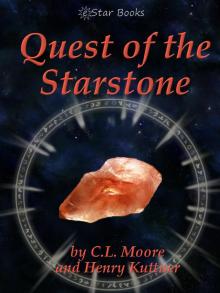 Quest of the Starstone
Quest of the Starstone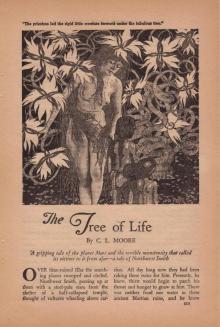 The Tree of Life
The Tree of Life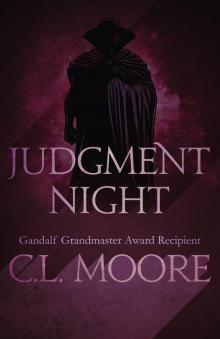 Judgment Night
Judgment Night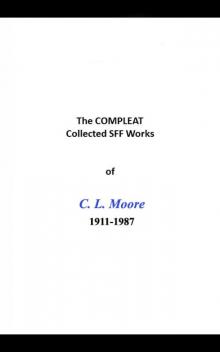 The COMPLEAT Collected SFF Works 1911-1987
The COMPLEAT Collected SFF Works 1911-1987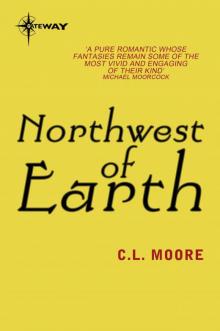 Northwest of Earth
Northwest of Earth No Boundaries
No Boundaries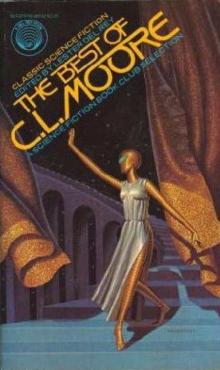 The Best of C. L. Moore
The Best of C. L. Moore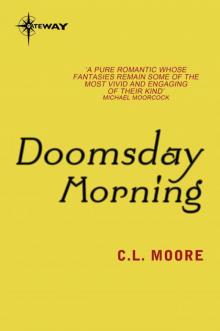 Doomsday Morning M
Doomsday Morning M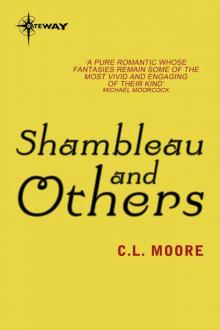 Shambleau and Others M
Shambleau and Others M Jirel of Joiry
Jirel of Joiry Judgment Night M
Judgment Night M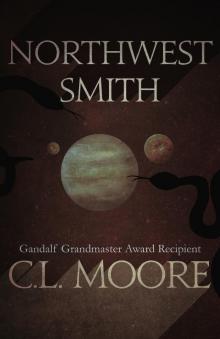 Northwest Smith
Northwest Smith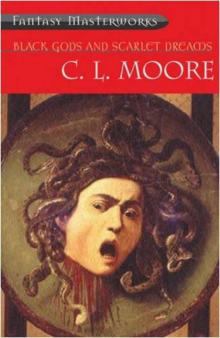 Black Gods and Scarlet Dreams
Black Gods and Scarlet Dreams